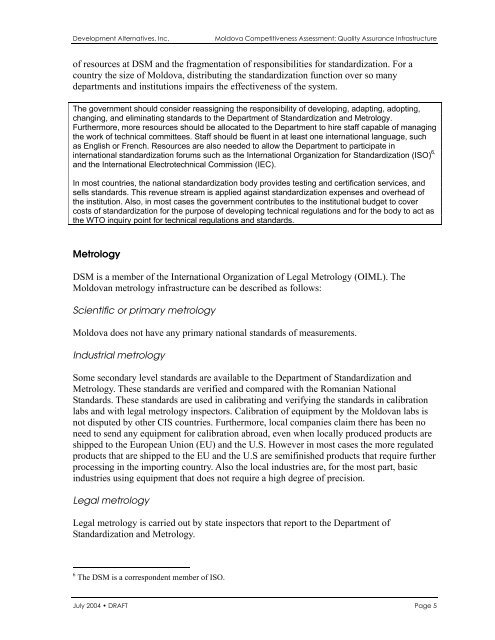Assessing Competitiveness In Moldova's Economy - Economic Growth
Assessing Competitiveness In Moldova's Economy - Economic Growth
Assessing Competitiveness In Moldova's Economy - Economic Growth
You also want an ePaper? Increase the reach of your titles
YUMPU automatically turns print PDFs into web optimized ePapers that Google loves.
Development Alternatives, <strong>In</strong>c. Moldova <strong>Competitiveness</strong> Assessment: Quality Assurance <strong>In</strong>frastructure<br />
of resources at DSM and the fragmentation of responsibilities for standardization. For a<br />
country the size of Moldova, distributing the standardization function over so many<br />
departments and institutions impairs the effectiveness of the system.<br />
The government should consider reassigning the responsibility of developing, adapting, adopting,<br />
changing, and eliminating standards to the Department of Standardization and Metrology.<br />
Furthermore, more resources should be allocated to the Department to hire staff capable of managing<br />
the work of technical committees. Staff should be fluent in at least one international language, such<br />
as English or French. Resources are also needed to allow the Department to participate in<br />
international standardization forums such as the <strong>In</strong>ternational Organization for Standardization (ISO) 6,<br />
and the <strong>In</strong>ternational Electrotechnical Commission (IEC).<br />
<strong>In</strong> most countries, the national standardization body provides testing and certification services, and<br />
sells standards. This revenue stream is applied against standardization expenses and overhead of<br />
the institution. Also, in most cases the government contributes to the institutional budget to cover<br />
costs of standardization for the purpose of developing technical regulations and for the body to act as<br />
the WTO inquiry point for technical regulations and standards.<br />
Metrology<br />
DSM is a member of the <strong>In</strong>ternational Organization of Legal Metrology (OIML). The<br />
Moldovan metrology infrastructure can be described as follows:<br />
Scientific or primary metrology<br />
Moldova does not have any primary national standards of measurements.<br />
<strong>In</strong>dustrial metrology<br />
Some secondary level standards are available to the Department of Standardization and<br />
Metrology. These standards are verified and compared with the Romanian National<br />
Standards. These standards are used in calibrating and verifying the standards in calibration<br />
labs and with legal metrology inspectors. Calibration of equipment by the Moldovan labs is<br />
not disputed by other CIS countries. Furthermore, local companies claim there has been no<br />
need to send any equipment for calibration abroad, even when locally produced products are<br />
shipped to the European Union (EU) and the U.S. However in most cases the more regulated<br />
products that are shipped to the EU and the U.S are semifinished products that require further<br />
processing in the importing country. Also the local industries are, for the most part, basic<br />
industries using equipment that does not require a high degree of precision.<br />
Legal metrology<br />
Legal metrology is carried out by state inspectors that report to the Department of<br />
Standardization and Metrology.<br />
6 The DSM is a correspondent member of ISO.<br />
July 2004 • DRAFT Page 5
















